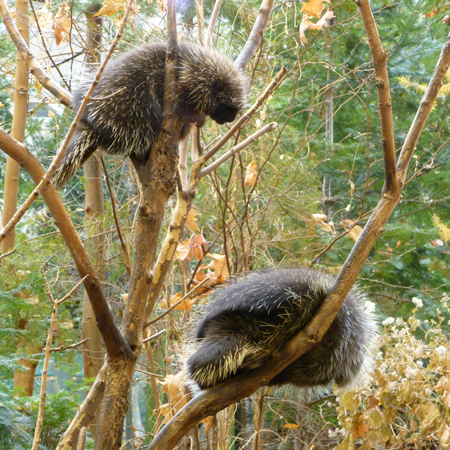After an icy morning, the boats travel more than eighteen miles up the Missouri River. Clark walks the shore in the morning and Lewis in the afternoon—the practice being that one captain is always with the boats. They camp near the mouth of the present Poplar River where they see numerous porcupines.
Porcupines
by Yellowstone Public Radio[1]Originally aired weekdays by Yellowstone Public Radio during the Bicentennial observance of 2003-2006. Narrated by Hal Hansen. Scripts by Whit Hansen and Ed Jacobson. Produced by Leni Holliman. © … Continue reading
Ice and Snow
The morning being very could we did not set out as early as usual; ice formed on a kettle of water ¼ of an inch thick. the snow has melted generally in the bottoms, but the hills still remain covered
—Meriwether Lewis
Porcupines
I walked out a little distance and met with 2 porcupines which were feeding on the young willow which grow in great abundance on all the sandbars; this anamal is exceedingly clumsy and not very watchfull I approached so near one of them before it percieved me that I touched it with my espontoon.—
—Meriwether Lewis
Noon
Capt. Clark walked on shore and killed an Elk which he caused to be butched by the time I arrived with the party, here we halted and dined being about 12 OCk. our usual time of halting for that purpose. after dinner Capt. Clark pursued his walk, while I continued with the party, it being a rule which we had established, never to be absent at the same time from the party.
—Meriwether Lewis
Porcupine River
Came to the little river, which I found to be a butifull clear Stream of about 100 yds. from bank to bank . . . . This river we call Porcupine from the great number of those anamals found about it’s mouth.
—William Clark
Other Sightings
Weather Diary
State of thermometer at rise
Weather Wind at rise
State of thermometer at 4 P. M. Weather Wind at 4 P. M. State of the river 26 [above 0] fair W. 46 [above 0] cloudy W. fallen ¼ in. hard frost last night. at four P. M. the snow has not yet entirely disappeared.— the new horns of the Elk begin to appear.
—Meriwether Lewis[2]To assist the reader, the editor of this web page has omitted the date column, merged the “State of the river” columns, and spelled out some abbreviations.
Notes
| ↑1 | Originally aired weekdays by Yellowstone Public Radio during the Bicentennial observance of 2003-2006. Narrated by Hal Hansen. Scripts by Whit Hansen and Ed Jacobson. Produced by Leni Holliman. © 2003 by Yellowstone Public Radio. |
|---|---|
| ↑2 | To assist the reader, the editor of this web page has omitted the date column, merged the “State of the river” columns, and spelled out some abbreviations. |

